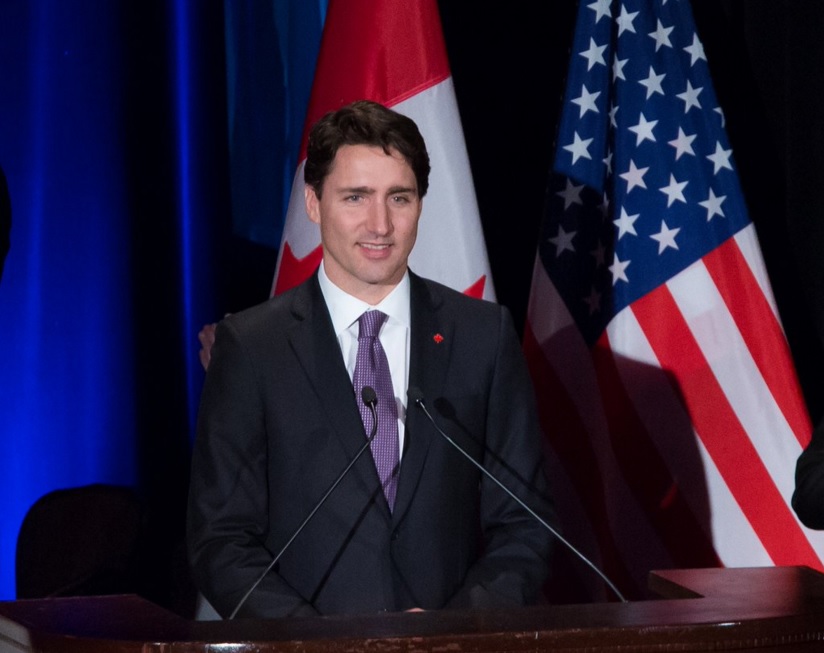
OTTAWA—Prime Minister Justin Trudeau is choosing to highlight the one goal he has in common with Donald Trump — improving the lot of the embattled middle class — as his government comes to grips with the unexpected prospect of a U.S. president who shares few of the Liberals’ values or policies.
“We share a purpose, our two countries, where we want to build places where the middle class and those working hard to join it have a chance,” Trudeau told a WE Day rally Wednesday, just hours after Trump emerged victorious from the brutish American presidential election campaign.
The very mention of Tuesday’s election south of the border drew boos from the youthful crowd but Trudeau tried gamely to put the best face on Trump’s win, suggesting it was propelled by the same forces that catapulted him into the Prime Minister’s Office a year ago.
“The fact is, we’ve heard clearly from Canadians and from Americans that people want a shared shot at success,” he said.
“People want to succeed. People want to know that themselves, that their families, that their kids, that their grandkids will be able to succeed and we need to work together to get that.”
But the two men’s prescriptions for what ails the middle class — and their manner of appealing for its votes — couldn’t be more different. And that portends a potentially prickly and tense relationship between them for at least the next four years.
Trump overcame concerns about his unstable temperament and misogynistic conduct by exploiting working-class white Americans’ fear of immigrants and terrorism and their anger at the so-called establishment elites they believe are reaping the benefits of free trade and globalization at their expense.
He promised to deport millions of illegal immigrants, to block Muslims from entering the country, to tear up the North American Free Trade Agreement and to withdraw the United States from the international climate change agreement to reduce carbon emissions.
Trudeau is in many ways the anti-Trump, a self-described feminist who won power with his “sunny ways,” touting the virtues of hope over fear, diversity, free trade and increased acceptance of immigrants and refugees.
Once elected, he personally greeted the first of 30,000 Syrian refugees to arrive in Canada. More recently, he announced his government’s plan to impose a national price on carbon in provinces that refuse to impose their own.
In the first sign of the ripple effect from Trump’s win, Saskatchewan Premier Brad Wall, the most vociferous opponent of pricing carbon, leapt Wednesday on the election outcome to urge Trudeau to abandon his plan.
“It makes no sense for our federal government to push ahead with imposing a national carbon tax when our biggest trading partner, and our biggest competitor for investment and jobs, is not going to have one,” Wall said in statement.
Throughout the year-long presidential campaign, Trudeau resolutely refused to publicly denounce Trump, promising to work with whomever won the presidency. However, his party wasn’t as shy.
In a fundraising missive in September, the Liberal party asserted that the choice facing Americans was the same as that facing Canadians last fall: “Hope or fear? Diversity or division? Openness and inclusion or turning our backs on the world?”
In what may have been an attempt to avoid any similar sentiments being expressed now that might antagonize the incoming president, Trudeau was the only spokesperson Wednesday for the federal government. Requests for comment from several ministers’ offices were referred to the Prime Minister’s Office.
As well, Trudeau held a conference call with Liberal MPs, apparently aimed at avoiding the kind of anti-American outbursts by backbenchers that helped fray Jean Chretien’s Liberal government’s relationship with George W. Bush’s White House.
“The message was very clear to us: We do not comment on other peoples’ elections,” one MP, who was not authorized to speak publicly about the call, said afterward.
“We were just told to be circumspect.”
The MP suspected the “ghost of Carolyn Parrish” was hovering over the call. The former Liberal MP was famously overheard in 2003, on the eve of Bush’s invasion of Iraq, muttering “Damn Americans. I hate those bastards.” She later stomped on a Bush doll for the comedy show, “This Hour Has 22 Minutes.”
For his part, Trudeau insisted Wednesday — as he did throughout the presidential campaign — that Canada’s relationship with the U.S. transcends the personalities of the two countries’ leaders, even though it’s evident his team would have been more comfortable with, and already had extensive contacts with, Trump’s Democratic rival, Hillary Clinton.
“The relationship between Canada and the United States is based on shared values and shared hopes and dreams and we will always work well together,” he told the WE Day rally.
“We are strong because we listen to each other and we respect each other.”
In Montreal, NDP Leader Tom Mulcair refused to take back his assertion last March that Trump is “a fascist” as he urged Trudeau to “stand up to Trump.”
“I think when you see the type of racist, sexist comments that were made by Mr. Trump during the campaign those are things we don’t want here in Canada,” he said.
However, even the NDP seems inclined to soften its stance against Trump now that he is poised to take power. Mulcair refused to repeat the word “fascist” and his party has taken down an online petition to bar Trump from entering Canada and tell him “that hate and discrimination are not welcome” here.
Interim Conservative leader Rona Ambrose issued a statement congratulating Trump and asserting that the U.S. would “remain Canada’s closest friend and ally.”
“Our unique relationship has stood the test of nearly 150 years,” she said, urging Trudeau to work with the incoming Trump administration to hammer out a deal on softwood lumber and ensure Canada continues to benefit from NAFTA.